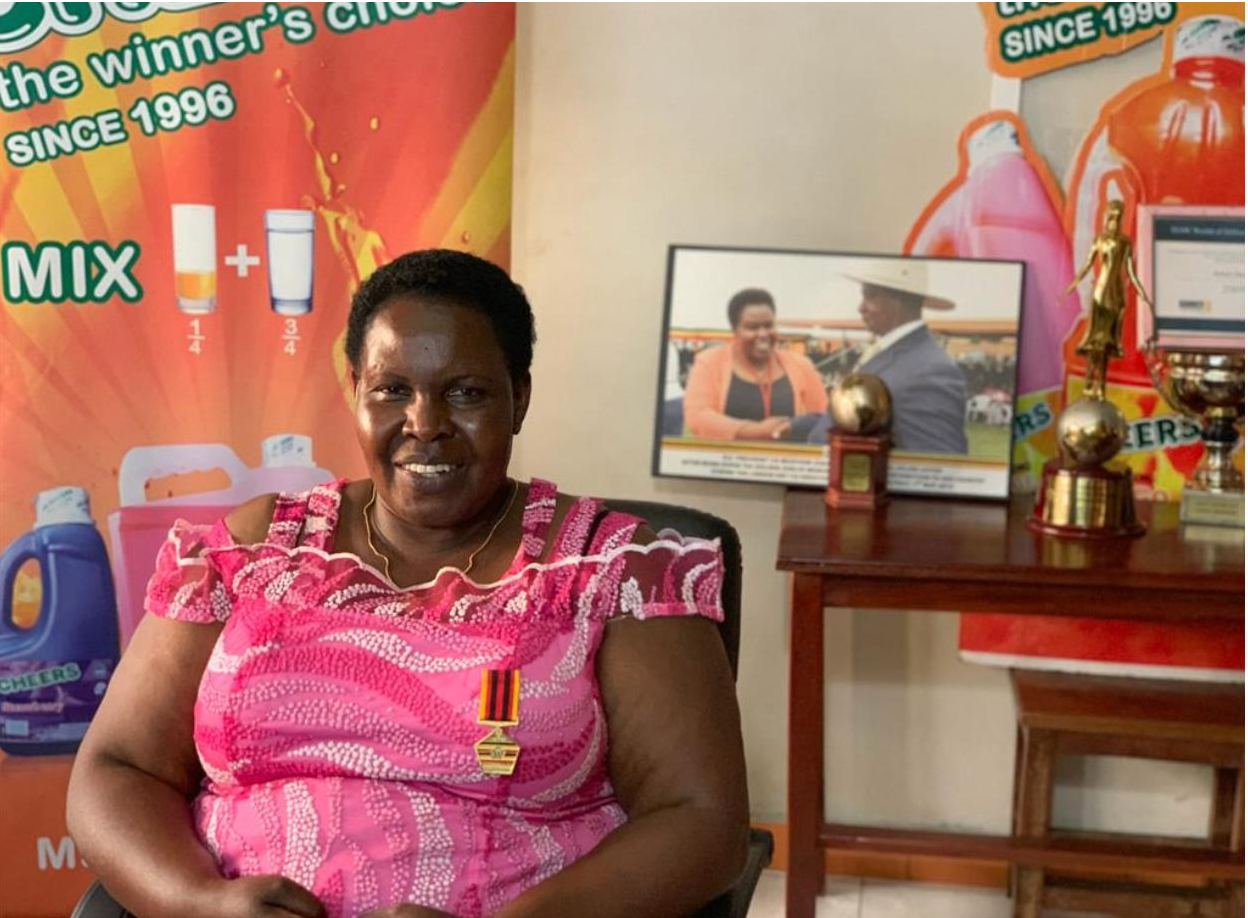Take five: “As an empowered social entrepreneur and climate change champion, it has been my responsibility to create opportunities for women’s empowerment”
Date:

Dr. Julian Adyeri is a leading female entrepreneur in Uganda. She is the CEO and Founder of Delight Uganda, a processing and packaging fruit juice company. Dr. Julian started this initiative to provide hands on skills as well as training and mentorship for women in Uganda. This work has been supported by UN Women with support from the Embassies of Sweden and Japan.
What does your work in climate activism entail?
I was driven by the desire, as a social entrepreneur, to counter the effects of climate change related crop failure due to weather vagaries. This has led to limited household income, food insecurity and poor livelihoods. The realization that women are more vulnerable due to their alienation from developmental activities, land ownership and decision-making led me to seek to empower and skill women and girls through strengthening their capacity on managing agricultural enterprises and enhancing their practical hands on skills in agriculture with Delight.
I was driven by the passion of making fresh juice from locally grown fresh fruits. We have planted 1,000 acres of improved varieties of mangoes, 150 acres of citrus, 200 acres of guavas, 50 acres of cashew nuts, 2000 jackfruit trees, 815 soursop trees, 500 acres of clonal eucalyptus and 200 acres of compensatory forests. We intercrop with seasonal crops such as green gram, soya beans, ground nuts and hybrid sorghum. The farms have a nursery seed bed with a capacity of up to 2,000,000 seedlings for assorted fruits, tree species, coffee and agroforestry seedlings.
What is your message to the leaders tackling climate action?
Tackling climate change requires a multi-dimensional approach. Leaders should be at the forefront in this campaign. One way to encourage this campaign is to call upon the leaders to see to it that men, clan and community leaders equitably enable and empower women with land use rights to plant trees on landscapes and forests for collective regeneration.
What actions do you think are most needed to advance gender equality in the context of climate action?
Women in Uganda must be granted land use rights to reconstruct the woods that are destroyed daily. I would encourage fruit tree farming (mango, citrus, guava, cashew nut, avocado, macadamia, jackfruit, soursop, paw paws and coffee) as a business and a form of afforestation. There is need for affirmative action supported by government agencies and development partners to embrace gender equality in the context of climate action.
How have you supported other women in your community on climate action?
As an empowered social entrepreneur and climate change champion, it has been my responsibility to create ground for women’s empowerment by helping them to become entrepreneurs. Women and girls face challenges whereby they don’t know what to do or where to start from. They also face gender harassment and discrimination when it comes to access to production resources.
At the Delight Farm Institute, we organize meetings for capacity building and mentorship sessions, transforming women and girls into future entrepreneurs. Since 2015, we have distributed seedlings to women in the community. We have so far distributed 280,000 agroforestry tree seedlings, 1,682,400 mango seedlings, 748,800 citrus seedlings, 352,320 guava seedlings, and 896,000 coffee seedlings in Nwoya District, Northern Uganda.
We are building women’s capacity on gender mainstreaming, mindset change, leadership, and group dynamics plus conflict management. This has been mainly through encouraging and promoting inclusive participation of young women and girls for improved and sustainable fruit (seed to juice on the table) and crop value chain management by:
- Enhancing the capacity of women as change agents in Climate Smart Agriculture.
- Promoting women’s participation and decision-making on issues affecting climate change (activism).
- Engaging stake holders in the gender strategy and related issues e.g. spouses, parents, cultural leaders, local leaders, SMEs (small and medium-sized businesses), CBOs (community-based organizations), etc.
We do all of this using media, community dialogues, inspirational speakers, focus group discussions, spousal and parental engagement, cultural and religious gatherings, among others.
How has the actions you have taken benefitted climate action?
- Diversified production to overcome crop failure (Intercropping)
- 8,000 women and girls have been trained and mentored as climate change activists and practitioners in Northern Uganda at the Delight Farm Institute.
- Women and girls have adopted the use of climate smart agriculture practices and are producing resiliently.
- Increased cohesion of women groups working together with a business mindset and understanding of farming as a business with regard to environmental protection.
- In Nwoya district, there’s evidence of reduced GBV cases as the women are empowered as change agents, counsellors and moral rehabilitators.
- Male and spousal engagement has enhanced household production capacities through giving of land user rights and supporting the women in the production process this has brought peace & harmony in the home.
- We have continued to bulk and market together at our common user facility funded by NARO (the National Agricultural Research Organization) at our farm in Nwoya District.
Through these initiatives, farmers are seeing the benefits of actively engaging women, and registering need for affirmative action to ensure every woman is a beneficiary. We are happy to tell our story and seek partnerships to empower more women.